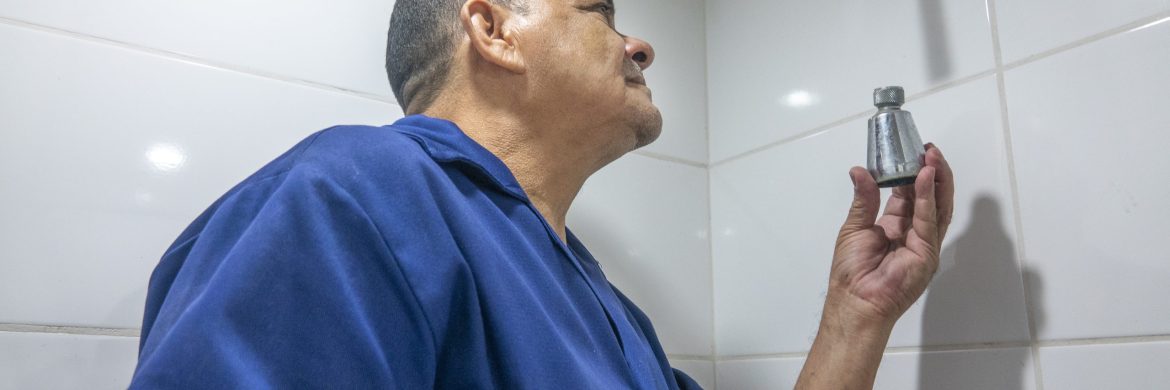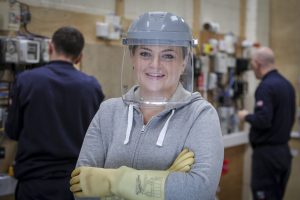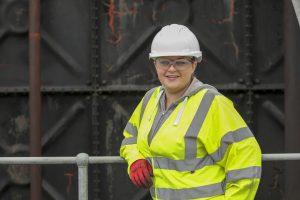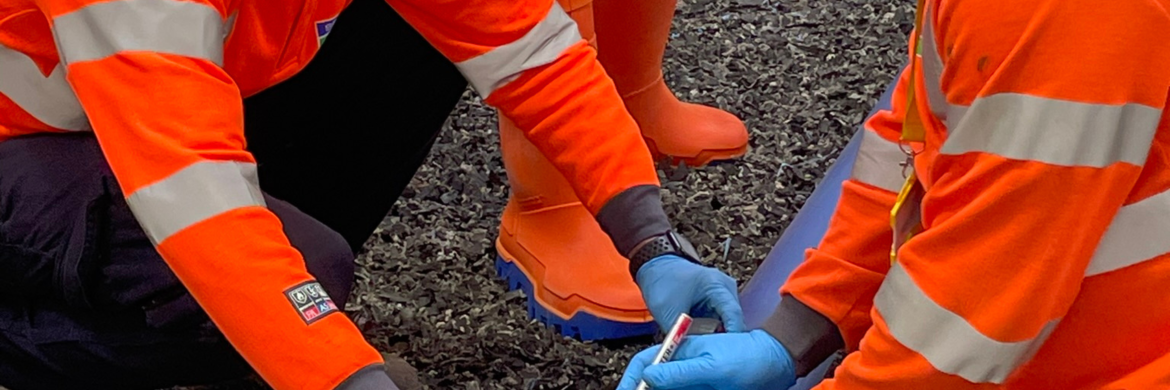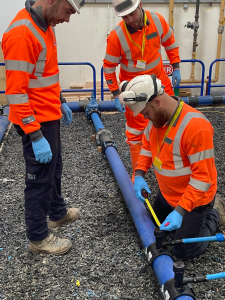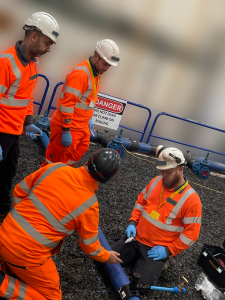Managing Legionella: A Deep Dive with Senior Water Systems & Legionella Trainer, Dan Sutherland
01 May 2024 Blogs
Legionella, the bacterium responsible for Legionnaires’ Disease has for many, been a concern for those who manage, install and maintain water systems across various industries, particularly with high risk recirculating systems and healthcare settings. Training is a critical part of competence no matter whether it is an initial or a refresher course and it is critical to develop knowledge and skills continually.
In this in-depth exploration, we turn to Dan Sutherland, a Senior Water Systems & Legionella Trainer at Develop Training, a leading accredited provider of Compliance, Technical, and Safety training.
Understanding the threat of legionella
Legionella pneumophila sero-group 1, the species / strain mostly responsible for confirmed cases of Legionnaires’ disease in the UK, thrives in warm and moist environments, particularly in man-made water systems such as evaporative cooling systems, spa pools, old/complex hot water systems such as those that can be found within hospitals / large commercial buildings.
Dan emphasises the importance of recognising the potential risks associated with Legionella: Pneumonia can not only be fatal (more commonly where there is increased susceptibility) but there is increasing evidence that long term systems will be debilitating for many that recover.
Legislation / Industry Standards
Understanding and adhering to specific industry legislation is crucial for effectively managing Legionella. This is to ensure the safety of persons exposed to the systems. In the UK, there are several statutory / non-statutory legal documents and industry bodies / guides that govern the control and prevention of Legionella-related risks:
- Health and Safety at Work Act 1974:
The Health and Safety at Work Act 1974 provides the foundational framework for workplace health and safety in the UK. Under this legislation, employers / anyone responsible for the workplace have a duty to ensure the health, safety, and welfare of their employees and non-employees, including protection against risks associated with Legionella.
- Control of Substances Hazardous to Health (COSHH) Regulations 2002:
The COSHH Regulations place specific emphasis on substances and preparations that can pose a hazard to health in the workplace, and Legionella is one such substance. These regulations require employers to assess and control the risks associated with hazardous substances, including the biological parasite Legionella.
- Management of Health and Safety at Work Regulations 1999:
These regulations provide a framework for managing health and safety in the workplace. They require employers/persons in control of premises to conduct suitable and sufficient risk assessments, adequately train their staff, plan for incidents, implement control measures, communicate and co-operate and regularly review and update their safety policies.
- The Reporting of Injuries, Diseases and Dangerous Occurrences Regulations 2013 (RIDDOR):
RIDDOR requires employers and others, eg someone who has control of work premises, to report to the HSE, accidents and some diseases that arise out of or in connection with work. Legionellosis is a notifiable disease under certain circumstances.
- The Notification of Cooling Towers and Evaporative Condensers Regulations 1992 (NCTEC):
These Regulations require employers to notify the local authority, in writing, if they operate a wet cooling tower or evaporative condenser and include details about where they are located. The Regulations also require notification when such devices are no longer in use.
- HSE Approved Code of Practice (ACOP) L8: Legionnaires’ Disease: The Control of Legionella Bacteria in Water Systems and associated technical guidance documents
This book is aimed at dutyholders, including employers, those in control of premises and those with health and safety responsibilities for others, to help them comply with their legal duties in relation to legionella. These include identifying and assessing sources of risk, preparing a scheme to prevent or control risk, implementing, managing and monitoring precautions, keeping records of precautions and appointing a manager to be responsible for others.
- Legionella Control Association (LCA) Code of Conduct:
The Legionella Control Association (LCA) is a voluntary organisation whose membership comprises providers of services and products concerned with the control of legionella bacteria in water systems. The primary aim is to keep water systems safe and minimise the risk of cases of Legionnaires’ disease caused by poorly maintained systems. The LCA sets out an industry recognised Code of Conduct for legionella service providers and audit their management systems annually. Adhering to the LCA Code of Conduct demonstrates a commitment to best practices and higher standards in Legionella management.
- The Water Management Society
The Water Management Society (WMSoc) is a not-for-profit membership organisation that has been providing practical and technical training solutions to individuals and companies within the water management industry for over 50 years.
The object of the society is to promote the advancement of water management for the benefit of industry, commerce, the environment and the public. In furtherance of this object, but not otherwise:
- To promote the interchange of scientific information among persons interested in water management by means of meetings, lectures, demonstrations, discussions and publications as appropriate.
- To encourage education and training in water management.
- To co-operate with other bodies interested in water management, welfare and technology.
Dan emphasises,
Compliance with these regulations is not just a legal requirement but a fundamental step in ensuring the health and safety of individuals in workplaces. It provides a structured approach to Legionella management, from risk assessment to the implementation of control measures, contributing to a safer environment for everyone.”
In summary, a combination of statutory / non-statutory legislation and industry-specific standards form the regulatory landscape for Legionella management in the UK, providing a comprehensive framework for professionals in water systems management.
Legionella Risk Assessment:
Legionella risk assessment is a fundamental aspect of Legionella management, mandated by legal requirements such as the Control of Substances Hazardous to Health (COSHH) Regulations 2002 and the Management of Health and Safety at Work Regulations 1999.
The risk assessment process should involve a comprehensive evaluation of water systems and the way they are managed, identifying potential breeding grounds, susceptibility to infection and the culture of management. It should provide a structured understanding of the system, leading to the formulation of targeted control measures including temperature/chemical management, regular and appropriate maintenance and ensuring competency of those that work on systems. The report generated serves as a record of compliance and due diligence.
A proactive and ongoing process, Legionella risk assessment ensures the prevention of Legionnaires’ disease by regularly reviewing and updating control measures in response to evolving water system conditions.
Dan stresses the need for a systematic approach:
The law requires suitable and sufficient risk assessment. The assessor’s competence / their employer’s management systems / how well the risk assessment was prepared for before the day are each critical components. It should involve an assessment of records, a survey of the system and attempts made to verify the necessary competency is in place. Risk assessment is the first step for many and so poor risk assessment will lead to poor understanding and control going forward for some. Conducting a thorough risk assessment is not only a legal requirement but also a proactive measure to identify potential hazards.”
Training for Legionella Management:
Ensuring employees are suitably qualified in the management of Legionella / implementation of controls, helps to safeguard public health as well as ensure compliance with stringent regulations. Specialised training is essential for effective Legionella management.
Dan explains,
Develop Training offer a range of Legionella / Water System courses from Awareness to Role of the Responsible Person, Risk Assessment and Water Regulations/Byelaws amongst others. Our aim is to empower learners with the knowledge and understanding they need for their role, to take the proactive measures needed to control Legionella”.
With so much to know and understand in this sector (where we touch on aspects including plumbing, legal requirements, water systems, water treatment and risk assessments etc)., Legionella training goes beyond theoretical knowledge. It equips learners with practical skills to manage risks / implement controls effectively. We all take new knowledge away from training no matter how experienced you are.
The full list of Water Systems & Legionella courses offered by Develop can be found here: https://www.developtraining.co.uk/training/estates-and-facilities-management/water-systems-legionella/
Ongoing Legionella Monitoring and Control Measures:
Effective management of Legionella doesn’t end with a one-time risk assessment. Regular water testing, temperature checks, and maintenance of water systems are essential for preventing Legionella growth. Professionals must implement control measures and, importantly, revisit and update these measures regularly.
Information from Industry Bodies:
Industry Bodies such as the HSE, LCA and WMSoc are integral to organisations who want to stay updated on the latest developments in Legionella management and grow their knowledge base. Professionals are able to access valuable resources, stay informed about emerging trends and network with peers facing similar challenges.
The Future of Legionella Management:
As technology evolves, so do the tools available for Legionella management. Dan envisions a future where smart monitoring systems play a crucial role:
Automation and real-time monitoring could revolutionise Legionella management in the future and it is already is for some. Real time results, analysis and notification can only be a beneficial tool to aid control. Imagine a system that detects temperature variations or water quality issues instantly, allowing for swift intervention and prevention.”
Conclusion:
Managing Legionella is a complex and ongoing process that demands the expertise of trained professionals. Through specialised training, compliance with regulations, and a proactive approach to risk assessment and controls, individuals working in water systems can contribute to a safer environment.
As technology continues to advance, the future of Legionella management holds promising innovations, ensuring the ongoing battle against this persistent bacterium remains at the forefront of water system safety.
Contact us
If you have any questions, or require more information about the training offered by Develop, please contact our Customer Service team on 0800 876 6708 or email enquiries@developtraining.co.uk
The full list of Water Systems & Legionella courses offered by Develop can be found here: https://www.developtraining.co.uk/training/estates-and-facilities-management/water-systems-legionella/
About the Author



